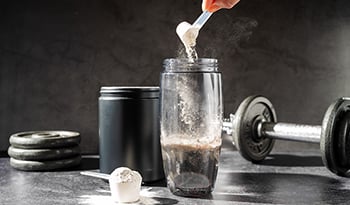Hydroxymethylbutyrate (HMB) Health Benefits, Exercise Performance, and Muscle Mass

HMB (Hydroxymethylbutyrate) has recently gained much interest among athletes, weight lifters, and fitness enthusiasts. Those in the health and fitness community often look for methods to improve health and increase athletic performance.
What Does HMB Do?
HMB assists with muscle growth and enhances exercise performance. In addition, it is used to prevent sarcopenia or age-related muscle loss and muscle loss. HMB also appears to increase muscle strength and promote heart health.
Food Sources of HMB
Unfortunately, very little HMB is found in natural sources, although foods such as grapefruit, avocado, yogurt, alfalfa, beef, chicken, and catfish have a small amount. As a result, HMB is often taken as a dietary supplement.
Keep reading to learn more about HMB and how it benefits athletes and health and fitness enthusiasts.
What Is Hydroxymethylbutyrate?
Hydroxymethylbutyrate is a naturally occurring substance in your body that acts as an antimetabolic agent and prevents muscle breakdown and cell damage.
When the amino acid leucine breaks down, HMB is produced. Leucine is one of the three branched-chain essential amino acids (BCAAs) your body needs for protein synthesis and muscle repair. BCAAs are also a popular supplement amongst weight lifters. Interestingly, leucine seems to have the most potent protein-building or anabolic effect out of all the amino acids.
HMB also stimulates muscle protein synthesis by increasing anabolic (growth) signals and lowers protein breakdown by decreasing catabolic (destruction) signals. However, the body has too little HMB naturally to reverse muscle loss. Furthermore, the amount of HMB in natural food sources such as dairy and meat needs to be bigger to make a significant difference. As a result, many people take supplements to increase HMB content in the body and ultimately inhibit leucine breakdown.
Health Benefits of HMB
Besides plenty of anecdotal evidence, numerous scientific studies and clinical trials also support the claims of HMB's effectiveness on muscle mass. And while the research continues and scientists keep adding new insights, here is why hydroxymethylbutyrate keeps popping up on almost every health and fitness forum.
HMB Promotes Muscle Growth
Muscle growth remains the most sought-after benefit for which one takes HMB, and rightly so, as plenty of research suggests that HMB stimulates muscle protein synthesis, improves body composition, and increases strength performance in athletes and health and fitness enthusiasts. It was in the early 90s when the researchers first began looking at the effects of HMB on muscles during resistance training. In 1996, researchers at Iowa State University found that HMB decreases exercise-induced protein breakdown and muscle damage and results in considerable gains in muscle function.
Since then, research on HMB has exploded; consequently, plenty of evidence supports the claims made about HMB. A study published in 2000 showed that HMB significantly increases fat-free mass. Another study in the same year found that Hydroxymethylbutyrate supplementation increases upper body strength and minimizes muscle damage when combined with an exercise program in both men and women. Likewise, a study published in the European Journal of Applied Physiology showed that HMB enhances hypertrophy, strength, and power following regular resistance training.
Furthermore, many researchers have also looked at the mechanism of action of HMB in the human body. For example, a 2009 study found that it promotes rapid muscle cell growth and differentiation and prevents cell death. In addition, Hydroxymethylbutyrate strengthens the integrity of muscle cell membranes, boosts protein synthesis by increasing gene transcription, and enhances cell survival.
HMB Helps Reduce Muscle Loss
Whether age-related or caused by a sedentary lifestyle or a health condition, muscle loss or sarcopenia can be very frustrating. Decreased muscle mass also increases one's risk for falls and subsequent hip fractures as we age.
Muscles are crucial to performing daily functions, pumping blood through your body, and breathing. They are required for survival and play a role in our metabolism. Good muscle strength indicates fitness and is associated with longevity and quality of life. As a result, muscle wasting can be very troubling.
Research suggests that HMB helps preserve muscle mass and decreases muscle atrophy induced by bed rest or other factors. HMB reduces muscle loss in many ways, such as suppressing the action of enzymes involved in muscle breakdown and reducing the expression of genes for these enzymes through a negative feedback mechanism. For example, a 2010 Taiwanese study involving 40 participants in a nursing home revealed that HMB supplementation reduces muscle breakdown among the elderly confined to bed due to sickness or age. Likewise, another study published in the Journal of Clinical Nutrition showed similar results.
To add more, a literature review of fifteen randomized clinical trials (RCTs) indicates that taking 3-4g of HMB a day significantly improves muscle mass and strength among people with various health conditions such as cancer, HIV, malnutrition, or kidney failure. RCTs are considered the gold standard for evaluating the effectiveness of medications or other interventions in the medical field.
Thus, Hydroxymethylbutyrate (HMB) is beneficial for muscles in two ways. It promotes muscle growth and prevents muscle breakdown, whether exercise-induced or otherwise.
May Lower the Risk of Heart Disease
Cardiovascular diseases are the leading cause of death worldwide, accounting for nearly 18 million deaths yearly. Risk factors for cardiovascular diseases include high blood pressure, tobacco use, high cholesterol levels, and diabetes. While the risk of cardiovascular health conditions is significantly less, professional athleticism or regular workout does not make one immune to these conditions. However, the good news is that HMB may also improve heart health and help prevent heart disease by reducing risk factors.
For example, research published by professor Steven Nissen (the man who discovered HMB) showed that the substance is safe for humans and significantly decreases cardiovascular risk factors. Professor Steven collected data from seven studies and concluded that HMB reduces total cholesterol, LDL (bad) cholesterol, and systolic blood pressure—the upper number on a blood pressure reading.
May Help Prevent Age-Related Mental Decline
Whether we like it or not, physical aging is a reality we can't escape, and it comes with all its challenges. And one of them is age-related neurodegeneration of the brain and the resulting decline in brain function. For example, Alzheimer's disease is an all too common mental health condition affecting millions worldwide. According to the Center for Disease Control (CDC) data, nearly six million US citizens have Alzheimer-related dementia, with tens of millions more affected worldwide. Furthermore, as the human population ages, the number of people affected by cognitive degeneration is also increasing.
Interestingly, research suggests that HMB may also prove beneficial in preventing age-related brain decline. For example, a 2015 study revealed that hydroxymethylbutyrate promotes neurite outgrowth—a process necessary for the proper growth and development of neurons. In addition, a study published in the Journal Neurobiology of Aging showed that HMB prevents the effects of aging on the neurons of laboratory mice. Likewise, several more studies suggest that HMB supplementation improves working memory, reduces cognitive deficits, and facilitates learning. However, research on this topic is still in its infancy, and extensive human trials are needed to make definitive claims.
May Reduce Inflammation and Promote Wound Healing
Research suggests that HMB also reduces inflammatory markers, whether exercise-induced or otherwise. For example, a study published in the Asia Pacific Journal of Clinical Nutrition showed that HMB consumption might have anti-inflammatory and anti-catabolic effects and improve lung function in people with chronic obstructive pulmonary disease (COPD). In addition, a 2016 study showed that it reduces interferon-γ, interleukin 8, and tumor necrosis factor-α — critical inflammatory markers.
Furthermore, a Turkish study suggests that Hydroxymethylbutyrate, arginine, and glutamine supplementation promote wound healing among people with diabetic foot ulcers. However, more research is needed to support these claims.
HMB Side Effects
Fortunately, Hydroxymethylbutyrate (HMB) is not associated with adverse health outcomes. There are no known medication interactions. It is safe and well-tolerated. HMB has minimal documented side effects, whether in early adulthood or old age, even in immunocompromised individuals. For example, a 2004 study showed that HMB, arginine, and glutamine could safely treat muscle wasting associated with AIDS and cancer. Another study revealed that eight weeks of HMB supplementation during resistance training had no adverse effects on the participants' liver, lipid profile, kidney function, or immune system.
In rare cases, you may experience stomach pain, constipation, or itching. You can take HMB alone or combine it with other nutrients such as vitamin D, arginine, or glutamine.
Consult your healthcare provider before adding a supplement to your routine.
Takeaway
Hydroxymethylbutyrate occurs naturally in the body as a breakdown product of leucine—an essential amino acid. HMB is involved in many signaling pathways in the body and can benefit health in many ways. Plenty of research has linked HMB supplementation to increased muscle growth and strength, reduced muscle breakdown in health and disease, and enhanced exercise adaptations. Additionally, some lab studies and human clinical trials suggest that HMB supplementation could reduce inflammation, lower the risk of cardiovascular health events and prevent age-related cognitive decline.
References:
- Molfino A, Gioia G, Rossi Fanelli F, Muscaritoli M. Beta-hydroxy-beta-methylbutyrate supplementation in health and disease: a systematic review of randomized trials. Amino Acids. 2013 Dec;45(6):1273-92.
- Wilkinson DJ, Hossain T, Hill DS, Phillips BE, et. Al. Effects of leucine and its metabolite β-hydroxy-β-methylbutyrate on human skeletal muscle protein metabolism. J Physiol. 2013 Jun 1;591(11):2911-23.
- Holeček M. Beta-hydroxy-beta-methylbutyrate supplementation and skeletal muscle in healthy and muscle-wasting conditions. J Cachexia Sarcopenia Muscle. 2017 Aug;8(4):529-541.
- Wilson, J.M., Fitschen, P.J., Campbell, B. et al. International Society of Sports Nutrition Position Stand: beta-hydroxy-beta-methylbutyrate (HMB). J Int Soc Sports Nutr 10, 6 (2013).
- Gallagher PM, Carrithers JA, Godard MP, Schulze KE, Trappe SW. Beta-hydroxy-beta-methylbutyrate ingestion, Part I: effects on strength and fat free mass. Med Sci Sports Exerc. 2000 Dec;32(12):2109-15.
- https://www.ncbi.nlm.nih.gov/pmc/articles/PMC4019830/
- https://www.sciencedirect.com/science/article/pii/S0167488908004345
- Portal S, Eliakim A, Nemet D, Halevy O, Zadik Z. Effect of HMB supplementation on body composition, fitness, hormonal profile and muscle damage indices. J Pediatr Endocrinol Metab. 2010 Jul;23(7):641-50.
- Wu H, Xia Y, Jiang J, Du H, Guo X, Liu X, Li C, Huang G, Niu K. Effect of beta-hydroxy-beta-methylbutyrate supplementation on muscle loss in older adults: a systematic review and meta-analysis. Arch Gerontol Geriatr. 2015 Sep-Oct;61(2):168-75.
- Hsieh LC, Chow CJ, Chang WC, Liu TH, Chang CK. Effect of beta-hydroxy-beta-methylbutyrate on protein metabolism in bed-ridden elderly receiving tube feeding. Asia Pac J Clin Nutr. 2010;19(2):200-8. PMID: 20460233.
- Deutz NE, Pereira SL, Hays NP, Oliver JS, Edens NK, Evans CM, Wolfe RR. Effect of β-hydroxy-β-methylbutyrate (HMB) on lean body mass during 10 days of bed rest in older adults. Clin Nutr. 2013 Oct;32(5):704-12.
- Danielle E Bear, Anne Langan, Eirini Dimidi, et. al, β-Hydroxy-β-methylbutyrate and its impact on skeletal muscle mass and physical function in clinical practice: a systematic review and meta-analysis, The American Journal of Clinical Nutrition, Volume 109, Issue 4, April 2019, Pages 1119–1132
- S. Nissen, R. L. Sharp, L. Panton, M. Vukovich, S. Trappe, J. C. Fuller, Jr., β-Hydroxy-β-Methylbutyrate (HMB) Supplementation in Humans Is Safe and May Decrease Cardiovascular Risk Factors, The Journal of Nutrition, Volume 130, Issue 8, August 2000, Pages 1937–1945
- https://www.cdc.gov/aging/aginginfo/alzheimers.htm#:~:text=In%202020%2C%20as,number%20of%2
- Salto R, Vílchez JD, Girón MD, Cabrera E, Campos N, Manzano M, Rueda R, López-Pedrosa JM. β-Hydroxy-β-Methylbutyrate (HMB) Promotes Neurite Outgrowth in Neuro2a Cells. PLoS One. 2015 Aug 12;10(8):e0135614.
- https://pubmed.ncbi.nlm.nih.gov/26973106/
- Hankosky ER, Sherrill LK, Ruvola LA, Haake RM, Kim T, Hammerslag LR, Kougias DG, Juraska JM, Gulley JM. Effects of β-hydroxy-β-methyl butyrate on working memory and cognitive flexibility in an animal model of aging. Nutr Neurosci. 2017 Sep;20(7):379-387.
- Hsieh LC, Chien SL, Huang MS, Tseng HF, Chang CK. Anti-inflammatory and anticatabolic effects of short-term beta-hydroxy-beta-methylbutyrate supplementation on chronic obstructive pulmonary disease patients in intensive care unit. Asia Pac J Clin Nutr. 2006;15(4):544-50.
- Sipahi S, Gungor O, Gunduz M, Cilci M, Demirci MC, Tamer A. The effect of oral supplementation with a combination of beta-hydroxy-beta-methylbutyrate, arginine and glutamine on wound healing: a retrospective analysis of diabetic haemodialysis patients. BMC Nephrol. 2013 Jan 12;14:8
- https://pubmed.ncbi.nlm.nih.gov/15080599/
- Gallagher PM, Carrithers JA, Godard MP, Schulze KE, Trappe SW. Beta-hydroxy-beta-methylbutyrate ingestion, part II: effects on hematology, hepatic and renal function. Med Sci Sports Exerc. 2000 Dec;32(12):2116-9.
DISCLAIMER:This Wellness Hub does not intend to provide diagnosis...
















































































 Table of Contents
Table of Contents
















